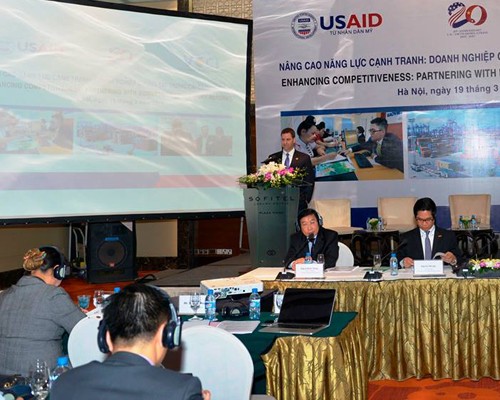
HANOI, March 19, 2015 -- It’s an honor to be here in Vietnam and have the opportunity to be with you this morning in Vietnam.
Mr. Loc, for your leadership as Chairman of the Vietnam Chamber of Commerce and Industry,
I would also like to recognize Mr. Le Minh Thong, National Assembly Vice Chairman of Law Committee
I just arrived to Vietnam this morning from USAID in Washington. It is a pleasure to be here.
It is an exciting time as 2015 marks the 20th anniversary of the normalization of U.S.-Vietnam diplomatic relations.
The anniversary is an opportunity to take stock in how far this relationship has come and how much it has benefited the people from our countries. Over the past 20 years, our bilateral trade has grown from only $450 million to over $35 million annually in 2014. Over approximately the same time period the people of Vietnam have reduced their country’s poverty level from nearly 60 percent in the 1990s to 17 percent in 2012.
The U.S.-Vietnam Comprehensive Partnership ambitiously broadens the spheres for our cooperation agenda. Our goal is clear: we want to help Vietnam become a stronger, prosperous country that respects the rule of law and human rights.
The U.S. Agency for International Development (USAID) believes the next few years offer a special opportunity to tailor our assistance strategy with Vietnam’s core development challenges and make valuable contributions to the U.S.-Vietnam bilateral relationship at this historic moment. In this context, I would like to share with you how we are working in partnership with you, the private sector and Government of Vietnam, on an ambitious trade, competitiveness and governance agenda.
While expanded trade has benefited many in both countries and contributed to meaningful reductions of poverty in Vietnam, governance problems are holding back changes needed to sustain the momentum and advance inclusive growth in Vietnam.
Since 2000, along with its partners, USAID has worked closely with the government and private sector to improve the general environment for trade and investment through the widely recognized series of Support for Trade Acceleration (STAR) programs.
Through STAR, USAID helped Vietnam meet requirements for the U.S.-Vietnam Bilateral Trade Agreement and then its accession to the World Trade Organization (WTO). A Senate report on the Asia rebalance stated that STAR, “which brought legal experts to Vietnam to help draft commercial laws, could be a model for other emerging partners in the region.”
But now we have opportunity to broaden the scope of U.S. engagement with Vietnam on critical governance issues. Therefore USAID has collaborated with the Vietnamese Government, among others, to design an even more ambitious and strategic successor to the STAR programs.
The Governance for Inclusive Growth (GIG) program was announced by Secretary of State John Kerry in late 2013, who made it clear that this was an investment in the future.
Through such programs as the GIG, we are identifying with our many government counterparts the best opportunities to support Vietnam to leverage the high standards set by the TPP to shape growth that is both sustainable and inclusive. A few examples of how USAID has recently been providing support on a number of important aspects of the government’s trade and competitiveness agenda.
For the last year, the GIG program has been working with the Central Institute for Economic Reform (CIEM) to support the implementation of Resolution 19 of the government, it was issued exactly a year ago. Resolution No. 19 sets targets to reduce the cost, time and risks of doing business in Vietnam, and has so far resulted in tangible improvements for businesses in Vietnam. These include a significant reduction in time taken for businesses to pay tax, and new Investment and Enterprise Laws that are anticipated to reduce the cost and time of starting a business in Vietnam.
Today’s event follows directly on a week-long intensive review of the Doing Business methodology by CIEM to identify where further reform will enable Vietnam to meet the ambitious new targets contained in the Resolution 19 for 2015, signed just last week by the Prime Minister. And understand a major focus of today’s discussion will be about the opportunities this creates for sustaining the momentum generated to date.
Reducing the time to trade across borders is also an areas showing strong potential for significant improvement. To achieve this, USAID is participating in a new public-private partnership with the Vietnam Chamber of Commerce and Industry and the American Chamber of Commerce.
This partnership will facilitate the private sector’s input into the implementation of the customs and trade facilitation provisions that will be required by trade agreements, including the TPP and Vietnam’s implementation of the WTO Trade Facilitation Agreement.
USAID chose Vietnam to pilot this innovative type of alliance because of our successful and growing trade relationship. It represents a new model for trade assistance that is rooted in real, substantive engagement with and leadership by the local business community.
It opens up the governance process and offers a powerful tool for integrating small and medium-sized enterprises into domestic and global value chains, which makes growth more inclusive.
In both of these examples, it has been the commitment to engaging directly and substantively with the private sector that sets them apart.
While new laws and regulations, trade agreement commitments and demonstrated commitment to reform by governments are all essential ingredients of effective efforts to improve the business enabling environment, only when they are complemented with meaningful partnership with the private sector can they be successfully transformed into effective institutional arrangements that enhance competitiveness. This is turn will deliver the governance to facilitate sustainable, broad based growth.
I wish you all a productive public-private dialogue this morning on your reform efforts to date and where you want to go together in the near future.
Thank you very much.







Comment
Make a general inquiry or suggest an improvement.